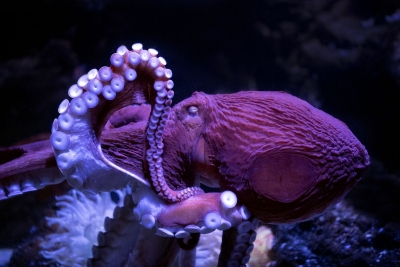
Octopus is a soft-bodied, eight-limbed molluscs of the order Octopoda. It lives in all the world’s oceans. It has a bulbous head, eight arms with suction cups on the bottom and three hearts. The colour of its blood is blue because of the copper-based protein called hemocyanin in the blood.
It squirts an ink-like liquid to deter predators. This will temporarily blind and confuse a potential attacker, giving him the time to swim away.
It can squeeze into (or out of) tight spaces in search of food and shelter. It diet includes clams, shrimps, lobsters, fish, and even sharks.
Females usually lay 200,000 to 400.000 eggs. They guard the eggs even without eating. Once the eggs hatch, the female octopus dies and so does male octopus within a few months.
Octopuses live in oceans all over the world. Most are pelagic, meaning they live near the water’s surface in shells, reefs and crevices. Some species live on the floor of the ocean, making their homes out of caves. Octopuses tend to be solitary, though they do interact with other octopuses at times. Some species of octopuses hunt at night, while others only hunt at dusk and dawn.
When scared, octopuses will shoot a dark liquid, sometimes called ink, at the thing that scared them. This will temporarily blind and confuse a potential attacker, giving the octopus time to swim away. The ink can also dull the attacker’s smelling and tasting abilities, according to the Smithsonian article.
Octopuses can also change color to hide and match their surroundings. They can turn blue, gray, pink, brown or green. The mimic octopus can also flex its body to resemble more dangerous animals, such as eels and lionfish, according to the World Animal Foundation.
If an octopus does get caught — no problem. They can lose arms and regrow them, according to National Geographic.
Octopuses are fast swimmers but they prefer to slowly crawl along the sea bottom. To swim, octopuses suck water into their bodies and shoot it out a tube called a siphon, according to the World Animal Foundation. This lets the octopus blast off, away from attackers.
Picture Credit : Google



